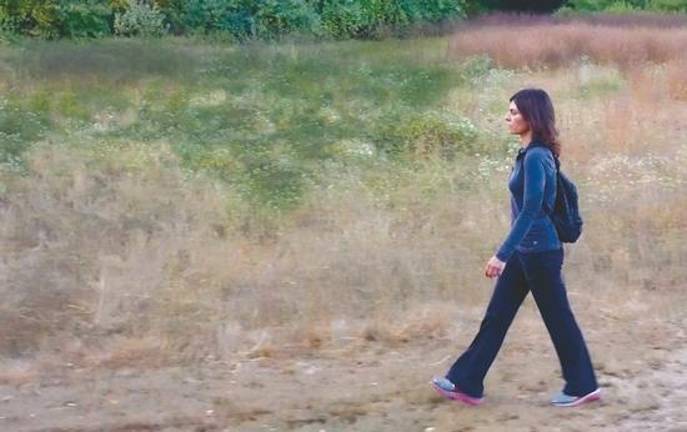Call it a walkumentary
Staving off chronic disease by eating plants and moving a lot

The first inkling Kelly Broelmann had that something was off was in 2009, when she lost vision in her left eye. The neurologist said her optic neuritis could be a symptom of multiple sclerosis. But she hadn’t had any other symptoms, so when it resolved after about eight weeks of steroids, she went back to her busy life—as a mom of a young son, owner of Kelly’s Music Corner in Middletown and back-up singer in her family’s band.
Seven years later she lost feeling in her lower body, from her waist to her toes. An MRI showed a lesion in her thoracic spine—again, possibly a symptom of MS. It “was absolutely terrifying,” she said, but this too went away in eight weeks with the help of steroids. When Broelmann had regained full feeling and motion, she told her doctor no. She didn’t want to do a spinal tap, the only concrete way to diagnose MS. She wasn’t ready.
As a mother, though, Broelmann had a nagging feeling that keeping her head in the sand was irresponsible, and in 2016 she got tested. She and her dad were driving to meet her sister for a band rehearsal in the city when she got the call with the test results. “Everything went black,” she recalled. “I was hysterically crying, screaming on the West Side Highway.”
Two weeks later, Broelmann walked into the office of Dr. Saray Stancic. Stancic has MS, too. She was diagnosed 25 years ago when she was a doctor in her thirties. She went through a period of being very ill, using a crutch to cross the parking lot, unsure if she should risk having children. Then she radically changed her life—adopting a plant-based diet (think vegan but stricter), walking many miles a day and getting off her prescribed drugs. In 2012, Stancic, now a mother of two, opened her own practice in Ramsey, NJ, one of the first “lifestyle medicine” practices in the country. Dirt ran a feature about her journey in 2015.
Now Stancic, who has not only reversed her disease but even run a marathon, is the subject of a new documentary called Code Blue. In it, Stancic travels the country to interview experts like Marion Nestle, a leading voice in food politics; Dr. T. Colin Campbell, author of The China Study, the 2005 runaway bestseller that has turned into a kind of vegan bible; and Dr. Kim Williams, past president of the American College of Cardiology. The message: some 80 percent of America’s chronic diseases could be prevented by lifestyle modifications like eating better, moving more, stopping smoking and cutting down on stress, but our antiquated healthcare system is stuck seeing disease through a pharmaceutical lens.
Stancic’s first appointment with new patients is two hours long and includes a thorough medical history, exam and education about the importance of exercise and a plant-based diet. It changed Broellman’s life. “She said you may have MS, but MS doesn’t have you,” Broellman recalled. “It doesn’t define you. There are things you can do to take control of yourself. Which was a huge gift. I felt like my life was over.”
At 5’1”, 200 pounds, Broelmann was obese when she walked into Stancic’s office. She also learned from Stancic that she was pre-diabetic. Along with her mom, Broellman went plant-based that very day. “I did cry every day about not having cheese,” she said. “I realized I had cheese at every single meal, had it for a snack. The weight started coming off immediately.” Broelmann and her son Charles, who’s now 11, make an appearance in Code Blue, cooking blueberry and strawberry crepes together, using flax seed in place of eggs.
Broelmann recently hosted a screening of Code Blue at Monhegan Middle School in Middletown. About 75 people showed up on a rainy Sunday morning, along with Stancic in her signature sneakers, ready to lead a walk after the movie.
Two and a half years after her diagnosis, Broelmann has lost 70 pounds, dropping from a size 18 to a size 6, and her MS is asymptomatic. She took no medications for a year after her diagnosis, then went on Copaxone, which helps prevent relapse. After having a reaction to that, she stopped taking Copaxone, and is laser-focused on her diet and lifestyle. Her next steps are cooking without oil, using water or vegetable broth instead; meditating daily and doing yoga weekly. “It’s ironic because I’m healthier now than I ever was pre-diagnosis,” she said. “A lot of times we feel powerless, and we’re not. This is my story, this is my truth.”
Find out more at codebluedoc.com.